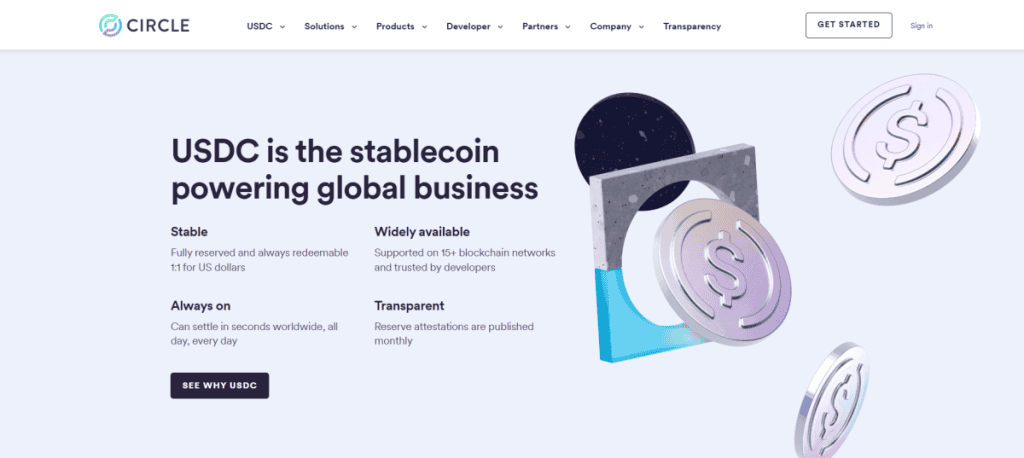
Circle Review
- 16th Aug, 2024
- | By Linda Mae
- | Reviews
Circle, a fintech company with a worldwide presence, was established in 2013 by Jeremy Allaire and Sean Neville. At first, Circle prioritized peer-to-peer payments and cryptocurrency wallet services, but has since shifted its focus to highlight stablecoin technology, specifically with the launch of USD Coin (USDC). The goal of the company is to utilize digital currencies and public blockchains to develop smooth and effective financial services. Circle provides a range of services such as money transfers, cryptocurrency trading, and business accounts, catering to both individual customers and businesses worldwide. Let’s delve deeper into the Circle Review.
Company Background | Circle Review
Circle was founded by Jeremy Allaire and Sean Neville with the goal of incorporating blockchain technology into traditional financial services. The company is based in Boston, Massachusetts, and has grown its global footprint. Throughout the years, Circle has received substantial funding from major companies such as Goldman Sachs, Baidu, and Jim Breyer, which has helped drive its growth and advancement in the fintech industry.
Under the leadership of Jeremy Allaire, Circle has focused on building a robust financial ecosystem around USDC, which is now one of the fastest-growing stablecoins. The business has achieved different important events, such as receiving large amounts of funding, buying Poloniex (which was later separated), and changing its focus to commercial uses of blockchain technology. Circle’s commitment to regulatory compliance and strategic partnerships, such as with BlackRock, has positioned it as a leader in the digital currency and blockchain industry.
Circle offers services for various users, including individuals and big businesses, allowing them to utilize blockchain technology for payments, trading, and financial activities. The innovative strategy and forward-thinking vision of the company are still fueling its growth and impact in the worldwide financial sector.
Circle’s Core Services
Circle offers a suite of financial services designed to harness the power of digital currencies and blockchain technology. These services include money transfers, cryptocurrency trading, investment platforms, trading apps, savings accounts, and prepaid debit cards, catering to both individual users and businesses.
Send and Receive Money: It provides a platform for both domestic and international money transfers. The process is user-friendly, allowing users to send money with just a few clicks. Transactions are quick, with numerous being finalized in a matter of seconds. Circle’s competitiveness in the market is strengthened by this efficiency, particularly for international transfers which are usually more expensive and slower with traditional banks. It typically charges lower fees compared to traditional banks, which appeals to users wanting to reduce transaction costs and have fast transfers. Compared to competitors like PayPal and Venmo, It stands out due to its integration of blockchain technology, which enhances security and reduces costs.
Buy and Sell Cryptocurrencies: It supports the trading of major cryptocurrencies, including Bitcoin, Ethereum, and its own USD Coin (USDC). The platform provides a user-friendly interface that enables users to easily purchase, sell, and oversee their digital assets. Transactions are efficient and protected, following all applicable rules to guarantee the security of user funds. The key to Circle’s competitiveness is the affordable transaction fees and the stability of USDC, supported by the US dollar. This makes it a preferable choice for users looking for a reliable and cost-effective cryptocurrency trading platform.
Circle Invest: It Invest is designed to simplify the investment process for novices. The platform offers a straightforward way to diversify investment portfolios by purchasing a range of cryptocurrencies. One major advantage is the minimal entry barrier, as there is no mandatory minimum deposit, enabling users to begin investing with small sums. In addition, It Invest offers educational materials to assist users in making informed choices, making it a great choice for beginners in cryptocurrency investing. The platform’s portfolio management tools aid in monitoring and adjusting investments, promoting diversification and risk management.
Trading App: Circle’s trading app offers a comprehensive suite of features for buying, selling, and managing cryptocurrencies on the go. The app is designed with user experience in mind, providing 24/7 access to trading with competitive exchange rates. The interface is clean and intuitive, making it accessible for both beginners and experienced traders. Circle’s app differentiates itself from other trading apps by being integrated with the wider Circle ecosystem, enabling smooth transfers between accounts and convenient access to other financial services provided by Circle.
Savings Account: Circle’s savings account feature allows users to earn interest on their cryptocurrency holdings. The interest rates are competitive, providing an attractive alternative to traditional savings accounts. Customers can easily establish their savings accounts and the interest they accumulate will be automatically included in their total balance. The income is subject to taxes, however, individuals can keep their savings in cryptocurrency, which is advantageous for those seeking to expand their digital wealth. Accessibility is a key feature, with no minimum balance required, making it accessible to a wide range of users.
Prepaid Debit Card: The Circle prepaid Visa card offers users the convenience of spending their cryptocurrency in everyday transactions. The card can be used for online and in-store purchases, as well as ATM withdrawals. One of the primary benefits is the ability to convert cryptocurrency to fiat currency instantly, allowing users to utilize their digital assets seamlessly. Nevertheless, the card can only be accessed by people living in the US, which restricts its worldwide use. Even with this drawback, the prepaid card improves the usefulness of cryptocurrencies, making them easier to use in daily life.
Circle’s wide range of services makes it a versatile and easy-to-use platform for handling digital finances, attracting both beginners and expert users.
Pros and Cons of Using Circle
It offers a range of financial services, making it a notable player in the fintech space. Here are some of the pros and cons of using Circle.
Pros
User-friendly interface: It is designed to be intuitive, making it accessible for users with varying levels of technical expertise. Whether you are sending money, trading cryptocurrencies, or managing investments, Circle’s interface simplifies these processes.
Versatile financial services from one platform: Circle’s platform offers a wide array of financial services. Individuals have the ability to transfer and receive funds, exchange digital currencies, engage in financial investments via Circle Invest, and utilize a prepaid debit card for daily purchases. Circle’s versatility allows it to serve as a comprehensive solution for a range of financial requirements.
Competitive exchange rates and low fees: It offers competitive exchange rates, especially for international transactions, and keeps fees relatively low compared to traditional financial institutions. This makes it an attractive option for users looking to save on transaction costs.
24/7 customer support: It offers customer support 24 hours a day, ensuring users can receive help whenever required. This type of assistance is essential for a worldwide financial system, since problems can occur unpredictably.
Integration of blockchain technology for enhanced security: It leverages blockchain technology to provide secure financial transactions. This integration not only enhances the security of transactions but also reduces costs and increases efficiency.
Cons
Lack of insurance coverage for funds: A disadvantage of utilizing Circle is the absence of insurance protection for user funds. Circle, unlike typical banks with FDIC insurance, does not offer the same security measures, which could be worrisome for certain customers.
Limited country support: Circle’s services are not available in all countries. This limitation can be a significant drawback for users in unsupported regions who want to access Circle’s services.
Prepaid card availability restricted to US residents: The Circle prepaid Visa card is restricted to US residents, which hinders its usefulness for users outside the country. This limitation decreases the overall ease of using Circle for daily transactions worldwide.
Limited cryptocurrency options for trading: While It supports major cryptocurrencies like Bitcoin, Ethereum, and USD Coin, the platform offers fewer options compared to some other cryptocurrency exchanges. This limitation might be a disadvantage for users looking to trade a wider variety of digital assets.
Fees and Rates
Circle offers a variety of financial services, each with its own fee structure. Understanding these fees is essential for users to manage costs effectively.
Detailed Breakdown of Fees for Various Services: For money transfers, it generally offers competitive rates. Domestic transactions within the Circle ecosystem are typically free, while international transfers may incur a small fee. The exact cost may differ based on the recipient country and the transfer amount. Trading cryptocurrency on Circle’s platform incurs a fee that is on par with fees on other leading exchanges. Purchasing and trading cryptocurrencies such as Bitcoin, Ethereum, and USD Coin typically incur a charge equivalent to a small portion of the total transaction value.
It Invest, the platform for cryptocurrency investments, charges no commission fees, which is a significant advantage for novice investors looking to avoid high costs. However, users should be aware of the spread, which is the difference between the buy and sell prices of the cryptocurrencies.
The Circle prepaid Visa card does not have any issuance or monthly maintenance fees, but users might incur fees for ATM withdrawals and foreign transactions. These fees are relatively standard compared to other prepaid cards available in the market.
Comparison with Industry Standards: When compared to industry standards, Circle’s fees are generally lower or on par with other major players in the fintech and cryptocurrency space. For instance, platforms like PayPal and Venmo charge higher fees for international transfers and currency conversions. In the cryptocurrency domain, Circle’s trading fees are competitive, often lower than those charged by other well-known exchanges such as Coinbase and Binance.
Transparency and Disclosure Practices: It is dedicated to being transparent and providing clear information about its fees. Every cost is clearly outlined before the transaction, so users know exactly how much they will be charged before finalizing the transaction. This practice differs from competitors by having transparent pricing and no hidden fees. Circle’s transparency strategy fosters trust with its users by giving them the necessary information to make well-informed financial choices.
Overall, Circle’s fee structure is competitive and transparent, making it an appealing choice for users looking to manage their finances efficiently and cost-effectively.
Contract Terms
Circle’s contract terms are designed to provide clarity and security for its users. Here’s an overview of the typical contract terms you can expect when using Circle’s services.
Overview of Typical Contract Terms with Circle: Circle’s terms of service outline the conditions under which users can access and use its financial services. These terms cover aspects such as account setup, usage rights, and the responsibilities of both the user and Circle.
Duration and Renewal Policies: Most of Circle’s services do not require long-term contracts. Instead, users typically agree to terms that are in effect for as long as they maintain an active account. Renewal policies are generally automatic, meaning that as long as the user continues to comply with the terms of service, their access to Circle’s services will be ongoing without the need for manual renewal.
Termination Clauses and Conditions: Circle’s termination clauses enable each party to end the agreement at any given time. If users no longer want to use Circle’s services, they have the option to close their accounts. Circle, in contrast, has the authority to pause or cancel an account if the user breaks the terms of service, participates in forbidden actions, or if there are suspicions of fraud or unlawful behavior. Notification is usually given to the user in these instances.
Customer Obligations and Responsibilities: Users are required to provide accurate and complete information during the account setup process and keep their account details up to date. They must also comply with all applicable laws and regulations when using Circle’s services. Additionally, users are responsible for maintaining the confidentiality of their account credentials and for all activities that occur under their account.
Customer Feedback and Complaints
Customer feedback is crucial in understanding the overall user experience with Circle. While many users appreciate the platform’s ease of use and efficient transaction services, there are several recurring complaints and issues.
Overview of Common Complaints and Issues: Common complaints about Circle often revolve around account verification delays, where users experience prolonged waiting times to get their accounts verified. Additionally, some users report issues with customer support, highlighting delays in response times and difficulties in getting satisfactory resolutions to their problems. Other concerns include occasional technical glitches and issues related to fund accessibility.
Analysis of Customer Reviews from Various Sources: An analysis of customer reviews from various sources reveals a mixed sentiment towards Circle. Positive reviews frequently mention the platform’s intuitive design and the seamless process for sending and receiving money. Users also praise the affordable transaction fees. Conversely, critical reviews frequently address the earlier mentioned problems relating to verification and customer service. Some users are feeling frustrated due to sudden account freezes and the delayed response from Circle’s support team.
Circle’s Response and Resolution Mechanisms: It has established several mechanisms to address customer complaints and issues. The company offers a comprehensive help center and 24/7 customer support to assist users with their problems. It is known to respond to complaints through multiple channels, including email and social media, striving to resolve issues promptly. Additionally, it continuously works on improving its verification processes and technical infrastructure to minimize disruptions and enhance user experience. Despite some ongoing challenges, Circle’s proactive approach to addressing user concerns reflects its commitment to customer satisfaction.
User Experience
The user experience with Circle is generally positive, marked by an easy account setup and verification process, smooth navigation, and responsive customer service.
Ease of Account Setup and Verification Process: Setting up an account with it is straightforward. Users need to provide basic information and complete a verification process, which includes identity verification steps. Although most users find the process smooth, some have reported delays in verification during peak times or due to specific regulatory requirements. It continuously works on streamlining this process to enhance user experience.
Navigation and Usability of the Website and App: The website and mobile app of Circle were created with a focus on being easy for users to navigate. Users can easily move through various functions like money transfers, cryptocurrency trading, and account management thanks to the user-friendly interface. The neat structure and thoughtfully arranged categories make it easy for users to locate desired information swiftly. The app runs smoothly with few technical problems, making it user-friendly for all levels of technical experience.
Customer Service Quality and Response Times: Customer service is a critical aspect of the user experience, and Circle provides 24/7 support through various channels, including email, chat, and social media. While many users appreciate the availability of support, there are mixed reviews regarding response times. Some users report prompt and helpful responses, while others have experienced delays, particularly during high-demand periods. It is actively working to improve its customer service response times to ensure timely support for all users.
Security and Compliance
Circle places a strong emphasis on security and compliance to ensure the safety and integrity of its platform.
Security Measures for Transactions and Data Protection: It employs advanced security measures to protect user transactions and data. This includes end-to-end encryption, multi-factor authentication (MFA), and secure storage solutions for sensitive information. These measures ensure that all data transmitted and stored on the platform is protected from unauthorized access and breaches. Circle’s use of blockchain technology also adds an extra layer of security, making transactions transparent and tamper-proof.
Compliance with Financial Regulations and Standards: It is dedicated to following international financial regulations and standards. The company is governed by licenses from various regulatory bodies in multiple locations, ensuring adherence to Anti-Money Laundering (AML) and Know Your Customer (KYC) rules. Adhering to strict financial industry standards helps Circle maintain the trust of its users and partners through regulatory compliance. Furthermore, Circle has secured a Major Payment Institution license from the Monetary Authority of Singapore, solidifying its regulatory position.
Incident Response and Fraud Prevention Strategies: It has a robust incident response plan in place to address potential security threats and breaches. The company employs a dedicated team of security professionals who monitor the platform 24/7 for any signs of suspicious activity. If a security incident occurs, Circle’s response plan involves promptly containing, investigating, and addressing the issue to reduce the impact. Moreover, it implements sophisticated fraud detection mechanisms that utilize machine learning to detect and stop fraudulent behavior instantly.
Overall, Circle’s comprehensive approach to security and compliance ensures a safe and reliable environment for its users, enhancing trust and confidence in its financial services.
Conclusion
Circle provides a versatile financial platform that is easy to use, has competitive fees, and strong security measures. Although it performs well in user interface and incorporating blockchain technology, it encounters difficulties with inadequate country coverage and certain customer service problems. Potential users must consider these pros and cons in order to decide if it meets their requirements.
FAQs
What is the primary use of Circle’s USD Coin?
USD Coin (USDC) is a stablecoin issued by Circle, pegged 1:1 to the US dollar. It is primarily used for facilitating digital transactions, providing a stable store of value, and enabling seamless transfers between traditional financial systems and digital currencies.
Are there any hidden fees associated with Circle services?
It openly discloses its fees, showing them clearly before transactions take place. Although the majority of services come with minimal fees, users should be cautious of potential charges for certain actions such as international transfers or ATM withdrawals.
How does Circle ensure the security of user funds and data?
It employs robust security measures, including end-to-end encryption, multi-factor authentication, and secure data storage. Additionally, it complies with regulatory standards, ensuring comprehensive protection and integrity of user funds and personal information.



